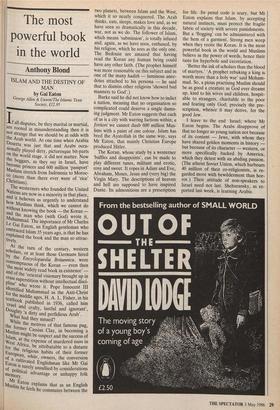The most powerful book in the world
Anthony Blond ISLAM AND THE DESTINY OF MAN by Gai Eaton
George Allen & UnwinIThe Islamic Texts Society, £12.95
If all disputes, be they marital or martial, are rooted in misunderstanding then it is not strange that we should be at odds with the Arab world. At one time when Arabia Deserta was just that and Arabs occa- sionally played dirty, picturesque bit-parts on the world stage, it did not matter. Now the beggars, as they say in Israel, have become princes and 600 million 'passport Muslims stretch from Indonesia to Moroc- co (more than there ever were of 'rice, .Christians). The westerners who founded the United Nations are now in a minority in that place, and it behoves us urgently to understand how Muslims think, which we cannot do Without knowing the book — the Koran — and the man who (with God) wrote it, Muhammad. The importance of Mr Charles Le Gai Eaton, an English gentleman who embraced Islam 35 years ago, is that he has explained the book and the man so attrac- tively.
At the turn a the century, western scholars, or at least those Germans hired by the Encyclopaedia Britannica, were contemptuous of the Koran — even then the most widely read book in existence' _ and of the 'oriental visionary brought up in crass superstition without intellectual disci- pline' who wrote it. Pope Innocent III identified Muhammad as the Anti-Christ for the middle ages, H. A. L. Fisher, in his textbook published in 1936, called him cruel and crafty, lustful and ignorant', Doughty 'a dirty and perfidious Arab'. What had they missed? While the motives of that famous pug, the former Cassius Clay, in becoming a M,. uslun might be suspect and the success of Islam, W.. est Africa, at the expense of murdered nuns in be attributable to a distaste for the religious habits of their former European, white, owners, the conversion _of a cultivated Englishman like Mr Gai Eaton is surely unsullied by considerations of political advantage or unhappy folk memory. Muslim ,Mr. Eaton explains that as an English winsllm he feels he commutes between the two planets, between Islam and the West, which it so nearly conquered. The Arab thinks, eats, sleeps, makes love and, as we have seen so dramatically in this decade, war, not as we do. The follower of Islam, which means 'submission', is totally infused and, again, as we have seen, enthused, by his religion, which he sees as the only one. The Bedouin are amazed that having read the Koran any human being could have any other faith. (The prophet himself was more reasonable on this subject and in one of the many hadith — luminous anec- dotes attached to his persona — he said that to dismiss other religions 'showed bad manners to God'.) Burke said he did not know how to indict a nation, meaning that no organisation so complicated could deserve a single damn- ing judgment. Mr Eaton suggests that each of us is a city with warring factions within; a fortiori we cannot daub 600 million Mus- lims with a paint of one colour. Islam has bred the Ayatollah in the same way, says Mr Eaton, that mainly Christian Europe produced Hitler. The Koran, whose study by a westerner 'baffles and disappoints', can be made to play different tunes, militant and erotic, cosy and sweet. It ropes in Adam and Eve, Abraham, Moses, Jesus and (very big) the Virgin Mary. The descriptions of heaven and hell are supposed to have inspired Dante. Its admonitions are a prescription for life. Its penal code is scary, but Mr Eaton explains that Islam, by accepting natural instincts, must protect the fragile fabric of society with severe punishments. But a 'flogging' can be administered with the hem of a garment. Strong men weep when they recite the Koran. It is the most powerful book in the world and Muslims believe in the power of words, hence their taste for hyperbole and excoriation.
'Better the ink of scholars than the blood ' of martyrs.' A prophet rebuking a king is worth more than a holy war' said Moham- mad. So, a pious practising Muslim should be as good a creature as God ever dreamt up, kind to his wives and children, hospit- able to strangers, charitable to the poor and fearing only God; precisely the pre- scription, whence it may derive, for the good Jew.
I leave to the end Israel, where Mr Eaton begins. The Arabs disapprove of that no longer so young nation not because of its content — Jews, with whom they have shared golden moments in history — but because of its character — western, or more specifically backed by America, which they detest with an abiding passion. (The atheist Soviet Union, which harbours 40 million of their co-religionists, is re- garded more with bewilderment than hor- ror.) Their attitude of non-speakers to Israel need not last. Shcharansky, as re- ported last week, is learning Arabic.


















































 Previous page
Previous page